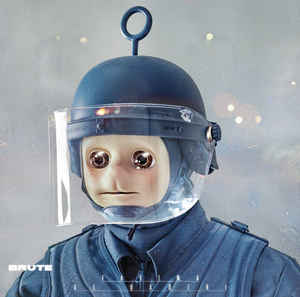Grime is a genre of electronic dance music (EDM) that emerged in London in the early 2000s. It developed out of the earlier UK dance style UK garage, and draws influences from jungle, dancehall, and hip hop. The style is typified by rapid, syncopated breakbeats, generally around 140 beats per minute, and often features an aggressive or jagged electronic sound. Emceeing is a significant element of the style, and lyrics often revolve around gritty depictions of urban life.

Hyperdub is a British, London-based electronic music record label and former webzine, founded by Steve Goodman, a.k.a. Kode9. The label was formed in 2004, and grew out of the UK's early dubstep scene. Artists signed to the label have included Burial, Cooly G, Dean Blunt, DJ Rashad, DVA, Fatima Al Qadiri, Ikonika, Jessy Lanza, Klein, Laurel Halo and Zomby.

Kevin Richard Martin, often known under his recording alias The Bug, is an English musician and music producer. Martin moved from Weymouth to London around 1990 and is now currently based in mainland Europe. He has been active for over three decades in the genres of dub, jazzcore, industrial hip hop, dancehall, and dubstep.

William Emmanuel Bevan, known by his recording alias Burial, is a British electronic musician from South London. Initially remaining anonymous, Burial became the first artist signed to Kode9's electronic label Hyperdub in 2005. He won acclaim the following year for his self-titled debut album, an influential release in the UK's dubstep scene which showcased a dark, emotive take on UK rave music styles such as UK garage and 2-step; it was named the album of the year by The Wire. Burial's second album, Untrue, was released to further critical acclaim in 2007.
2-step garage, or simply 2-step, is a genre of electronic music and a subgenre of UK garage. One of the primary characteristics of the 2-step sound – the term being coined to describe "a general rubric for all kinds of jittery, irregular rhythms that don't conform to garage's traditional four-on-the-floor pulse" – is that the rhythm lacks the kick drum pattern found in many other styles of electronic music with a regular four-on-the-floor beat.

Steve Goodman, known as Kode9 is a Scottish electronic music artist, DJ, and founder of the Hyperdub record label. He was one of the founding members of the early dubstep scene with his late collaborator The Spaceape. He has released four full-length albums: 2006's Memories of the Future and 2011's Black Sun, Nothing (2015), Escapology and Astro-Darien (2022).

Cyril Duval, who works under the name Item Idem, is a French conceptual artist, designer, and filmmaker. He lives and works in Taipei, Taiwan.
Zomby is a British electronic musician who began releasing music in 2007. He has released music on several labels, including Hyperdub, Werk Discs, and 4AD. Zomby's influences include oldschool jungle music and Wiley's eskibeat sound.
Liam Sylvester McLean, better known by his stage name Joker, is a British record producer who creates music in genres such as dubstep and grime and was known for creating the subgenre "purple sound". He was named "2009 king of bass music" by XLR8R magazine and was featured in the September 2009 issue of The Wire magazine. He has contributed to two releases produced by the London-based record company Hyperdub. He also runs his own label known as Kapsize Recordings. His debut album, The Vision, was released on 31 October 2011 through independent label 4AD. His sophomore LP, The Mainframe, was released on 16 February 2015 through his own Kapsize imprint.

Kindred is the fifth extended play by British electronic music producer Burial. It was first released on 13 February 2012 digitally by Hyperdub, with a vinyl release following on 12 March 2012. The EP was met with praise, with Metacritic assigning an averaged score of 88 out of 100 based on 17 reviews from mainstream critics. In Japan and selected world markets, Hyperdub issued Kindred as a compilation with Burial's previous EP Street Halo on 11 February 2012. The release, Street Halo / Kindred, placed on the Ultratop 50 albums chart.

Truant / Rough Sleeper is the sixth extended play by British electronic music producer Burial. It was digitally released by Hyperdub on 14 December 2012, with a vinyl and CD release following on 17 December 2012.

Scratcha DVA also known as DJ Scratcha, DVA [Hi; Emotions], Scratchclart and DVA is a British electronic musician, producer and DJ often associated with DVA Music, Hyperdub and Rinse FM. His debut album, Pretty Ugly (2012) and second album, Notu Uronlineu (2016) were both released on Hyperdub.
Fatima Al Qadiri is a Senegalese-born Kuwaiti musician and conceptual artist.

IN.RAK.DUST is the debut mixtape of Dutch E Germ, a project by musician Tim DeWit formerly of Gang Gang Dance. It was released on the UNO label on March 5, 2014. IN.RAK.DUST is an experimental bass and dub mixtape which constantly change in terms of tone and tension, which reflects the many tragedies that went on in DeWit's life. Reviews from music journalists were favorable, one critic calling it the "most technically daring and impressively produced" release of 2014.

Brute is the second studio album of Kuwait musician Fatima Al Qadiri. A protest album inspired by events such as the 2015 Baltimore protests and the Ferguson unrest, the album regards the authoritarian power of law enforcement in the United States and the illusion of democracy existing in the western part of the world. Its cover art by Josh Kline, Babok Radboy, and Joerg Lohse is a photograph of one of the "police teletubbies" found in Kline's art piece "Freedom," which was intended to present how civil rights were being destroyed in the 21st century. Brute features samples of the Ferguson protest, an MSNBC report of Occupy Wall Street by Lawrence O'Donnell, and an interview with a former member of the LAPD regarding the power of the police.

Desert Strike is the third extended play of Kuwait musician Fatima Al Qadiri. The record is based on Desert Strike: Return to the Gulf (1992), a video game that in turn is based on events of Operation Desert Storm of the Gulf War. As a kid who lived in Kuwait during the Gulf War, Qadiri played the game a year after it took place, which messed with how she remembered experiencing the actual war. Given how dark the game portrayed the Gulf War, she intended the extended play to represent a positive and "innocent" view of it by pairing a palette of childlike sounds with war sound effects. Released on 23 October 2012 by the label Fade To Mind, Desert Strike garnered generally favorable reviews from professional music journalists and landed on Spin magazine's list of the "Best Dance Albums of 2012."

Warn-U is the debut extended play of Kuwait musician Fatima Al Qadiri, released in September 2011 by the label Tri Angle. It was a part of her project Ayshay, which intended to reinterpret Islamic worship music. The EP only consists of Qadiri's falsetto vocals that are processed and altered to create other types of electronic sounds. The EP consists of three original tracks and a "megamix" of all of them by production duo Nguzunguzu.

Genre-Specific Xperience is a project by Kuwait musician Fatima Al Qadiri that serves as her second extended play in her discography. Its intention is to reinterpret five musical genres through audio and visuals: juke, hip hop, dubstep, electronic tropicalia, and what the press release labeled as "‘90s Gregorian trance." The main idea of the project regards what would happen if the "limitations" of a genre were bypassed or altered. The visuals for the tracks were produced by Tabor Robak, Sophia Al-Maria, Ryan Trecartin, Rhett LaRue, Kamau Patton, and production company Thunder Horse. The music videos premiered at New Museum on 21 October 2011, and the extended play itself was released by UNO Records on 25 October to favorable reviews from professional music journalists. A remix record titled GSX Remixes was released in May 2012 and features re-edits of tracks from Genre-Specific Xperience by acts such as Ikonika and DJ Rashad.

Shaneera is an extended play by Kuwait musician Fatima Al Qadiri, released on 13 October 2017 via the label Hyperdub. Marking Qadiri's move towards more dance-orientated material, Shaneera is conceptually about an "evil queen" that defies "binary status quo gender roles," a character that Qadiri appears as on the EP's cover art. Many critics found Shaneera much better than Qadiri's previous records for its playful use of its concept.

Future Brown is the self-titled debut studio album by American electronic music supergroup Future Brown, consisting of Fatima Al Qadiri, J-Cush, and members of the duo Nguzunguzu. Future Brown is an electronica album fusing together genres from a variety of different cultures and backgrounds. It features several rappers and musicians also associated with from a diverse set of music scenes such as Kelela, Tink, Riko Dan, Maluca, Shawnna, 3D Na'Tee, Tim Vocals, and Ruff Sqwad members Dirty Danger, Prince Rapid, and Roachee.
















